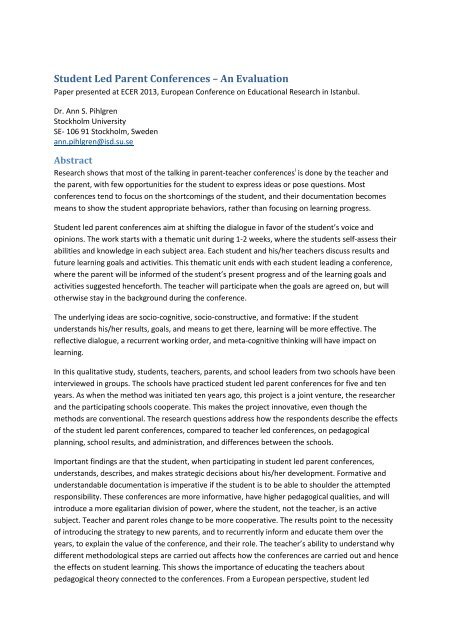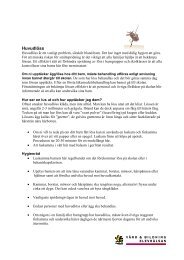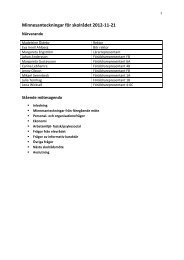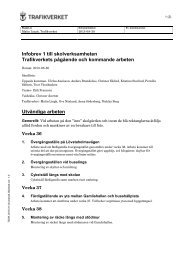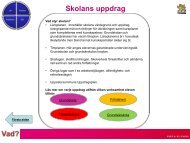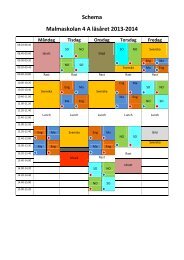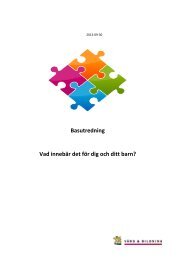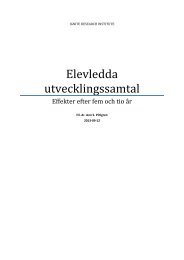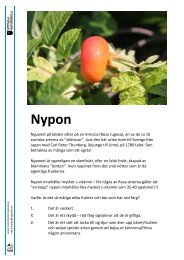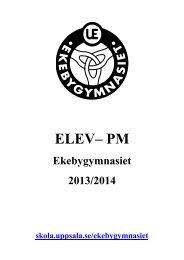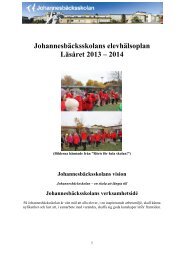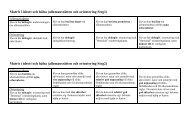Student Led Parent Conferences â An Evaluation
Student Led Parent Conferences â An Evaluation
Student Led Parent Conferences â An Evaluation
You also want an ePaper? Increase the reach of your titles
YUMPU automatically turns print PDFs into web optimized ePapers that Google loves.
<strong>Student</strong> <strong>Led</strong> <strong>Parent</strong> <strong>Conferences</strong> – <strong>An</strong> <strong>Evaluation</strong>Paper presented at ECER 2013, European Conference on Educational Research in Istanbul.Dr. <strong>An</strong>n S. PihlgrenStockholm UniversitySE- 106 91 Stockholm, Swedenann.pihlgren@isd.su.seAbstractResearch shows that most of the talking in parent-teacher conferences i is done by the teacher andthe parent, with few opportunities for the student to express ideas or pose questions. Mostconferences tend to focus on the shortcomings of the student, and their documentation becomesmeans to show the student appropriate behaviors, rather than focusing on learning progress.<strong>Student</strong> led parent conferences aim at shifting the dialogue in favor of the student’s voice andopinions. The work starts with a thematic unit during 1-2 weeks, where the students self-assess theirabilities and knowledge in each subject area. Each student and his/her teachers discuss results andfuture learning goals and activities. This thematic unit ends with each student leading a conference,where the parent will be informed of the student’s present progress and of the learning goals andactivities suggested henceforth. The teacher will participate when the goals are agreed on, but willotherwise stay in the background during the conference.The underlying ideas are socio-cognitive, socio-constructive, and formative: If the studentunderstands his/her results, goals, and means to get there, learning will be more effective. Thereflective dialogue, a recurrent working order, and meta-cognitive thinking will have impact onlearning.In this qualitative study, students, teachers, parents, and school leaders from two schools have beeninterviewed in groups. The schools have practiced student led parent conferences for five and tenyears. As when the method was initiated ten years ago, this project is a joint venture, the researcherand the participating schools cooperate. This makes the project innovative, even though themethods are conventional. The research questions address how the respondents describe the effectsof the student led parent conferences, compared to teacher led conferences, on pedagogicalplanning, school results, and administration, and differences between the schools.Important findings are that the student, when participating in student led parent conferences,understands, describes, and makes strategic decisions about his/her development. Formative andunderstandable documentation is imperative if the student is to be able to shoulder the attemptedresponsibility. These conferences are more informative, have higher pedagogical qualities, and willintroduce a more egalitarian division of power, where the student, not the teacher, is an activesubject. Teacher and parent roles change to be more cooperative. The results point to the necessityof introducing the strategy to new parents, and to recurrently inform and educate them over theyears, to explain the value of the conference, and their role. The teacher’s ability to understand whydifferent methodological steps are carried out affects how the conferences are carried out and hencethe effects on student learning. This shows the importance of educating the teachers aboutpedagogical theory connected to the conferences. From a European perspective, student led
conferences offer students, parents, and teachers a better chance to develop crucial information aswell as superior education.Keywords: parent conference, learning, feedback, meta-cognition, student influenceIntroductionAs in other European countries, the official theories about how students learn, as presented in thecentral curricula in Sweden, have changed over time. These changes have had an impact on theparent-teacher conferences (Pihlgren, 2011a): During the 1960’s the Swedish central curricula werebehavioristic (Lgr 69), and the parent-teacher conference was focused on how the student wasadapting to school standards. Through the 1980ies (Lgr 80) maturity and the wellbeing of thestudents were focused on. Today, the Swedish curricula (Lpfö 98, Lgr 11, Lgy 11), as in many otherEuropean countries, are inspired by theories of Lev S. Vygotsky and Mikhail Bakhtin, consideringlearning a social process, developing in interaction (Pihlgren, 2011a). A pedagogical dialogue is in thisparadigm central if learning is to take place (Dysthe, 1996; Säljö, 2000). The teacher will arrange thisinteractive learning, and will also have to ensure that the student and parent understand thestructures behind learning, how work and products are assessed, and what will be the next steptowards the learning goal, through pedagogical systems.The traditional parent-teacher conference is held by the teacher, and offers information to theparent (Pihlgren, 2011a), the student not being present (Hackmann, et al, 1998). However, in Swedenthe student has been present since the 1980ies, something that increases the productivity of themeeting (Minke et al, 2003). According to Swedish law (Skollagen, 2010:800) a personal plan for thestudent should be documented during the conference, with a written assessment of how thestudent’s results relate to the standards of the curriculum in all subjects. This documentation shouldshow student progression, and must be understandable to the student and the parent (Skolverket,2009). The documentation should inform the parents of the student’s results and furtherdevelopment, serve as source for school and teacher planning, and develop the student’s selfassessmentabilities. <strong>Student</strong>s in other European countries are generally not subject to the same typeof documentation (Hirsh, 2012). The Swedish ‘utvecklingssamtal’ (e.g. development dialogue), aparent-teacher-student conference, has formative focus on student’s achievements. Problems orspecial needs are supposed to be addressed in separate meetings, with separate types ofdocumentations, ‘åtgärdsprogram’ (remedial program) (Skollagen, 2010:800), equivalent to theEnglish IEP, ’Individual Education Plan’(Hirsh, 2012).<strong>Student</strong> led parent conferences are an expansion of the traditional parent-teacher conference, withthe intention of giving the student and the parent active roles (Moreau, 2008; Pihlgren, 2011b). Theaims are to help the student to focus his/her learning in order to support good results and to shiftthe dialogue in favor of the student’s voice and opinions. The suggested working order starts with athematic unit during 1-2 weeks, where the students self-assess their abilities and knowledge in eachsubject area (Pihlgren, 2011b; Wirström Nilsson, 2010). Each student and his/her teachers discussresults and plan future learning goals and activities (Pihlgren, 2006). Through this procedure thestudent and the teacher will be able to get a common understanding of the present progress andwhat will be the next step for the student. Products, representing the progress or achievement of thestudent, are chosen to illustrate the assessment, and the student will use these and thecommunicated assessment to present his/her knowledge and goals to the parent. The conference is
then rehearsed with a classmate, role playing as a parent, and revised if necessary. The thematic unitends with each student leading a conference, where his/her parents are informed of the student’spresent knowledge and abilities and of the learning goals and activities suggested henceforth. Thestudent uses an agenda to help keep in focus. The teacher will participate when the goals are agreedon, but will otherwise stay in the background during the conference. The conference is finallyevaluated by all participants and the documentation is saved to help planning the future work andwill be evaluated at the next conference, a half a year later.The purpose of student led parent conferences is that the student, by reflecting on his/herknowledge, competence, and future goals, (alone, with the teacher, with a friend, and finally with theparent), will understand how to proceed in learning.Although numerous parent-teacher conferences are performed every year, there is limitedknowledge of how they are performed (Hofvendahl, 2010). <strong>Student</strong> led parent conferences havehardly been systematically evaluated before. This research evaluates the effects after using thestudent led parents conferences for a longer time. The participating schools, Village School andSmall-town School (both pseudonyms), have used the method for five and ten years.LiteratureLev S. Vygotsky (1978) considers that all individuals to have a proximal zone, only reachable ininteraction. The context and the activities that the teacher constructs will mediate what is important.In dialogue the student will learn to have an inner dialogue (Linell, 1998). The underlying ideas of thestudent led conference are socio-cognitive, socio-constructive, and formative: If the studentunderstands his/her results, goals and means to get there, learning will be more effective (Pihlgren,2011a).This realization will be enhanced by formative assessment (Black & Wiliam, 1998; Sadler, 1989).When complex knowledge and abilities are assessed, and communicated to the students, rubricscould be used (Jönsson & Svingby, 2007). Rubrics will visualize quality levels, describe criteria withinthe subject area, and show indicators of different levels of competence (Hortlund et. al, 2005;Wiggins, 1998). Formative conferences can be done without using rubrics, but the teacher will stillhave to show what is demanded of the student (Körling, 2010). The student should internalize therubrics as expectations rather than seeing them as checklists of tasks, if rubrics are to be efficient inlearning (Ritchhart, 2002), and the teacher should consider them working tools rather than asobjective instruments (Stagg Peterson & McClay, 2010). Learning to use rubrics takes training,experience, and time, especially in the beginning (Lindström, 2002; Pihlgren, 2006).Self assessment and feedback to students from teacher and peers are successful ways to enhancestudents learning (Hattie & Timberley, 2007; Hawe et.al, 2008). Most students are able to assesstheir level of knowledge, even if students with special needs may have problems with selfassessment (Hattie, 2009). Self- and peer-assessment have to be coordinated with the teacher’sassessment in the beginning (Pihlgren, 2013). Assessment also has to be practiced regularly.Research shows that university students have a hard time assessing their performance orunderstanding the teacher’s assessment without support (Jönsson, 2011; Bek, 2012). Gradually, bybeing shown qualities and areas of improvements, the students will learn to interpret and evaluatetheir own and others performances (Hetland et al, 2007; Lindström in Lindström et al, 2011). Theteacher will have to realize that assessing is a process, where the student is an active participant,
gradually grasping and understanding the assessment criteria (Boistrup- Björklund in Lindström et al,2011; Hawe et al, 2008). The teacher should pose meta-cognitive questions, give feedback onproducts and processes, visualize the assessment criteria, and train the students to self-assess (StaggPeterson & McClay, 2010). Teachers often understand the importance of giving feedback andvisualizing the assessment criteria, but only a few teachers actually work with meta-cognitivequestions or training students to self-assess (Pihlgren, 2013b).However, all feedback does not have learning effects (Hattie & Timberley, 2007). Research implicatesthat feedback on a personal level, where the student is encouraged, praised, or scolded, have noeffects on learning, nor does feedback placing the students along a scale, like grades or test results,or collective feedback to the class. Feedback on the student’s working process is most effective, as isfeedback on a meta-cognitive level, visualizing how learning came about. Feedback on results has asomewhat weaker effect. Both positive and negative feedback seem to give effects on learning.Research shows that students generally have little influence in school (Aspán, 2009; Danell, 2006;Persson, 2010). The teacher led conference is mainly performed between the teacher and theparent, with the teacher as the main speaker. It’s focused on the shortcomings of the student(Hackmann et al, 1998; Hofvendahl, 2006; MacLure et al, 2000). The information dissects thestudent’s present results, instead of setting developing goals (Tholander & Norrby, 2008; Lindh-Munther & Lindh, 2005). Teachers tend to assess student’s character, ability to work, and to beproductivity, orderliness, and behavior instead of knowledge progression (<strong>An</strong>dersson, 2010; Elfström,2005; Vallberg Roth & Månsson, 2008). The more diffuse the assessment criteria are, the more openthe assessment will be to subjective interpretations and personal comments (Giota, 2006; Pihlgren,2011a). High performing students are more often judged from their performance than lowperforming, where the teacher tends to include the student’s personal character and adjust thejudgment to the student’s personal qualities (Eggen in Lundahl et al, 2010). Part of the teacher’sassessment is also related to the student’s willingness to learn. The conference and itsdocumentation become a means to show the student expected ways to behave properly (Granath,2008; Mårell-Olsson, 2012). The assessor has power over the individual’s identity, self- esteem, andfuture, as well as power to interpret what society considers valuable (Korp, 2003). The schools tendto see the documentation as means to motivate the student, rather than as part of the school qualitydevelopment program. The quality of the documentation differs widely between different schoolsand teachers (Giota, 2012; Skolverket, 2010), plus, the parent and student are often given theresponsibility for realizing the goals, while the teacher’s area of responsibility is not specified. Thismight lead to difficulties for children with less support at home.The same difficulties seem to occur when writing the IEP documents (Tennant, 2007). <strong>An</strong> Irish studyshows that students and parents feel less involvement if the documentation is complicated (Prunty,2011). Documentation can become bureaucratic and time-consuming resulting in the teacher makingsimplified and mechanical assessments (Gross, 2000; SENCo-Foum, 2001). However, the IEP-processcan have a positive effect on learning, if the goals are kept to three or four, and if the teacherbelieves in the method (Hirsh, 2012).Teacher attitudes towards the documentation could be described in three categories (Hirch, 2012).One group sees the documentation as information given to the parent (and the student) about thestudent’s performance and shortcomings. It considers the documentation time-consuming, with no
pedagogical effects. <strong>An</strong>other group considers the documentation as the pedagogical core of theeducation, a revisable document that continuously is used to show students’ goals and learningprocesses. The third group makes great efforts to formulate a correct language in their assessingdocuments. This group wants to work formatively but loses important aspects of learning, since thedocumentation is too difficult to understand, or to extensive, focusing on the results rather than theformative plan (Hirsh, 2012). This group is highly represented in the present Swedish practice(Hofvendahl, 2010). The teacher tends to read out loud – or ask the student to read – the teacher’sassessment in the conference, giving the assessment a sense of being not negotiable.Internationally, meetings are generally shorter, five to thirty minutes (Hackmann et al, 1998;MacLure & Walker, 2000), compared to the student led parent conference, which lastsapproximately an hour (Pihlgren, 2011a). The student talks the double amount of time in the studentled conference, compared to the teacher led one. The student clarifies his/her problems andpotentials, rather than having them described by the teacher (Tholander & Norrby, 2008). If theteacher takes part in the whole conference, he/she tends to take command (Hofvendahl in Lundahlet al, 2010). If the teacher doesn’t participate there is a risk that the student passively reads thedocumentation or communicates it incorrectly.<strong>Evaluation</strong>s of student led parent conferences in the USA and Sweden show improved studentresults, ability to plan, and to self-assess. <strong>Parent</strong>s are more satisfied with the information, their rolein the conference, and their cooperation with school. Teachers use conference and documentationmore effectively (Brolin Juhlin et al, 2012; Pihlgren, 2006; Stråle, 2012).MethodsThis paper presents the effects of using the student led parent conferences systematically for fiveand ten years in two schools. Village School is a municipal school in a larger rural area, including 250students grade K-6, most of them travelling to school by bus. The school is situated close to themedieval village church, and recruit children from farms and from a close-by villa area. Many parentshave a high school education or more, a good income, and there are few students with other culturalbackgrounds than Swedish. Small-town School is a K-9 charter school with pre-school, 200 students,and is run as a staff cooperative. It is situated in a town surrounded by a rural area, and severalchildren travel to school by bus. The parents have differing educational backgrounds with a stress onacademics. Small-town school participated in constructing the theoretical framework, objectives, androutines for the student led parent conferences, now practiced at both schools (Pihlgren, 2006).The following research questions have guided the research:How do the respondents describe the effects of the student led parent conferences,compared to the teacher led conferences, in the areas of information, student’s educationaland social development, on interaction and cooperation among parent-student-teacher, andon conference procedure?How (if so) do leaders and teachers describe that the student led parent conferences havechanged teachers’ and the schools’ pedagogical planning, the schools’ results (national tests,grades), and administration?What differences (if any) can be found when comparing the two schools’ descriptions of theeffects of the student led parent conferences?
ResultsThe overall method is described by all respondents in the same way. The parents are explicit aboutthe steps where they participate but are unsure about the work done before and after theconference. They know that the students prepare the conference but do not see this as a pedagogicalprocess, particularly not the parents at Village School. These parents do not consider the teacher partof the goal setting; they state that goals are decided by the student and the parent, a belief that canbe traced in the student survey answers. This differs in Small-town School where the parents knowthat teachers influence the goals by the preparatory work.The parents in Village School wish that they could read the documentation before the conference,since it is hard to understand it during the conference. However, the teachers of Small-town School,where parents get the information before by a digital system, say that many parents don’t read theaccessible documentation.The leaders stress the importance of the preparatory work, and that the quality of this will decidewhat effects the conference will have. They point out that students will not connect the conferenceto their learning, unless the teacher communicates the goals and assessments recurrently in class.I see a visible difference. Where a thorough work is done on beforehand, where the teacher has helped thestudent to understand her level of knowledge and the next step, there the level of agreement of student andteacher, and the quality of learning in the conference, is higher. ii [School leader]At Village School the entire conference is done at the same time in the school building. Especially theparents point out that this can be tiresome for the younger students. Small-town School has recentlyexperimented with splitting the conference in two parts: The information is communicated at home,and the portfolio and goal setting are communicated in school. The school also provides computersbefore the school conference, for students and parents who haven’t read the documentation. Thismakes it easier for younger students to be attentive all the time, but all students and parents don’ttake part of the documentation. <strong>Parent</strong>s are summoned to the part of the conference when theteacher participates actively and not to the part where the student relates the results and suggestedgoals, and hence, student activity has failed:In these conferences the student is less active, as in the former teacher led conferences. One loses the entiregood effect of the student led conference. [Teacher Small-town School]<strong>Student</strong> and teacher interviews at Village School show bigger differences in the teachers’ abilities tomake goals and processes visible to the students, and also bigger differences in the routinespracticed, than at Small-town School, where most teachers use rubrics to visualize development, andformative methods over the year. In Village School some teachers use rubrics but, according to thestudents, not all use formative assessment over the year.DocumentsThe parents say that the increasing central demands on schools to present informative documents toparents have resulted in written information that barely is understandable to the students or toparents. The students tend to read the comments from the teachers, and the conferences lose theactive participation of the student, parents and teachers say. The teachers think that thedocumentation is harder to understand for younger students, where communication is needed tomake it understandable. However, the students consider the documentation easy to understand and
that documentation is extremely important if they are to take on the responsibility. Nodocumentation from a teacher is much worse, as is receiving documentation too late tocommunicate it properly to the parent, students state. The students at Small-town School appreciatethe digital system, where goals and revisions are communicated several times during the preparatoryperiod. They consider their role in goal setting very important:When writing the assessment, I would suggest goals that I want to have. Sometimes you might get a goal thatyou don’t want, but this is because you have to practice it. I may not like all goals but it’s what I don’t know thatI’ll have to practice. [<strong>Student</strong>]Most students think that their teachers keep them well informed, something confirmed in thesurvey. The students in Village School say that some of their teachers don’t give them properfeedback and that they use other methods to try to determine their level:In [mentions a specific subject] the teacher tells us what we are supposed to learn, so there we know/--/otherwise you will know from test results or you might compare in the work book how much others have done.[<strong>Student</strong> Village School]The interviewed parents take great responsibility to ensure that the student understands the goals,sometimes without really understanding what the teacher means or what is expected of the student.They consider a lot of the information unnecessary.The first part where my child shows what she can and her work, that’s what I like. After that you go into thecomputer and it loses, then I take over. /--/ It depended on the comments from the teacher – it was cut andpasted. Then it feels like no value. [<strong>Parent</strong>]Most parents want the information simple, helping them to help the child to understand how theyshould continue. On the other hand, they say that they have learnt over time to understand thecurriculum and the central goals.I can pretty quick see the core, strengths and weaknesses of my child. I see what I should bring forward… I haveunderstood the goals better. /--/ I think that the children will get a very clear picture of what they know andneed to practice. Just as I see the core. [<strong>Parent</strong>]The teachers confirm that parents get a better understanding of the curriculum and goals, and thatparents overall are more satisfied with the student led information because they don’t feel assessedthemselves. The conferences gain from having several groups in the same room, as parents learnfrom other parents.The school leaders point out that they have worked with the teachers to adapt the language in thedocumentation, but that teachers in the beginning tend to comment on students’ character orbehavior rather than their knowledge. The teachers confirm that it is hard to be informative andunderstandable in the written documentation. Overall, the teachers say that information in thestudent led conference is more nuanced and reliable, presenting a clearer picture of the student’sabilities for all, as the information and goals are communicated and negotiated several times beforepresented to the parent. The goals are made obvious to the student by the student becoming a… specialist of his learning and school work. The parent has to hold back. [Teacher]
EffectsThe students state that the conference helps them to understand and assess how they shouldimprove their knowledge, and to set their own level, what to invest in. This opinion was alsoconfirmed by the survey. The students consider the main function of the conference as motivatingthem to further acquisition of knowledge. They learn to take responsibility for studying, organizing,presenting and talking in the conference.Neither of the respondents thinks that the conferences help students to better immediate results intests or grades. Instead, they all describe the abilities that are strengthened by the conferences: Selfassessing,responsibility, goal setting, and reaching the goals. The leaders point out that the studentsmeet authentic meta-cognitive situations in the conference, students will have to reflect on andassess their learning, and this will have strong effects in a lifelong learning perspective.The respondents all point out that the student led conferences lead to higher student influence. Theyounger students value their level of influence higher than the older, who describe a negotiatingprocess, the same way as the teachers do. The leaders, teachers, and parents state that there hasbeen a positive shift of power towards the student; but the teacher makes the last decision. Thestudents also say that the dialogue with the parent differs from that at home, the parent has to listento the student delivering, and the student chooses what to stress.The teachers say their planning is highly affected by what goals will be set in the conferences, andthis is confirmed by the students. However, the students think that it’s their responsibility to worktowards reaching the goals, with some help from the teacher and the parent.The interviewed teachers say that the student led conferences take time, especially to prepare, butteachers who have experienced teacher led conferences state that these are even more time- andenergy-consuming, and with poorer results.The actual [student led] conference saves time and energy, I used to be exhausted before [in the teacher ledconference] and then I also had to relate what other teachers had said. [Leader and teacher]Teachers and leaders agree that formative assessment takes longer time, but that it results in betterunderstanding and responsibility among students. Other described effects of the student ledconferences are that the parents tend to come much more than before, that fathers are morerepresented and sometimes even grandparents, and that it is easier to relay information to an absentparent, as the child can repeat the informative part of the conference at home.RolesAll students are satisfied with the conferences and don’t want the teacher to take over – that wouldlead to the grown-ups talking, and that students wouldn’t be able to influence decisions. <strong>Student</strong>salso think that parents prefer to be informed by their child, not the teacher. The preparations take alot of hard work, but it’s worth the effort:It becomes clear to me what I want to develop and what I can actually accomplish. I’m forced to consider whateffort I’m prepared to put into the work. It’s not the teacher’s matter, it’s mine. [<strong>Student</strong>]The students think that they will inform the parent better than the teacher.Teachers don’t know everything. They know some, but they don’t know all I can. [<strong>Student</strong>]
<strong>Student</strong>s see it as an important part of the preparatory work to inform the teacher of theirknowledge level:Well, it’s important to the teacher too… they get to know what you know and so on. [The interviewer: So youinform them?] Yes, so they know. [<strong>Student</strong>]Leaders and teachers say that there are great differences when comparing the student ledinformation to the teacher led, especially concerning influence:This is a completely different conference really. Instead of relating information it’s the student who describes hisor her development. The effects are that the teacher will see the student’s situation from another and clearerperspective. The student poses questions about his or her development, the assessment is of higher quality, andthe student’s perception of schoolwork is made visible. [School leader]The students express that they are highly satisfied with the student led conferences, in particularthat the grown-ups have to listen to their opinions.It’s good that you can talk to the teacher and the parent at the same time. I’m alone and get all the space tomyself. [<strong>Student</strong>]The conversations about schoolwork at home benefit from the conferences as their parents getbetter at posing questions. Four of the students have participated in teacher led conferences. Theyconfirm that the student led conference takes more effort, but that the positive effects will make upfor this. They remember the teacher led conferences as uninteresting and that they weren’t involved.They remember being more worried:I felt uncomfortable before. You sat there with the parent and the teacher and didn’t know what she would say.Now you know what’ll happen. I feel expectant: it’ll be fun to tell the parent. But it takes more work. [<strong>Student</strong>]The school leaders see changes in the parental role: the parents see new capacities in their children,and they listen more to them, and pose better questions both to student and teacher. This results ina more cooperative school-parent interaction. Most parents are very satisfied with the student ledconferences and point at the big differences to teacher led conferences.You have really high trust in your child. You don’t have to nag, they know what to do. My older child is in highschool now, a traditional system. You see how he feels hopeless because it’s like a game where you study to thetest and the conference is something you have to do. There the parent becomes a police –’Do your homeworkand turn in your assignments!’ The dialogue child-parent is different. [<strong>Parent</strong>]They feel joy and are proud of what the child accomplishes in the conference, and express that therelationship to their child change in a positive way:They learn to reason. Not just telling what they know, it’s elaborate. I’m impressed of the way my child talks tome about his knowledge. I feel like crying./--/ This is really high quality. [<strong>Parent</strong>]Some parents have problems adapting to the participative role. They want more contact with theteacher, or tend to take over the role as chairman, teachers and leaders state. Leaders also point outthat some teachers have problems trusting the students to inform properly. The leaders stress theimportance of educating parents and teachers in how and why the method is used.
ConclusionsLife-long responsibility for learningThe student led parent conferences give effective information to parents and students. They providethe school with planning documentation, and the results show that they provide students withimportant planning information, an effect not reached in the teacher led conferences (Hofvendahl,2006). The student led conference is a pedagogical context (cf. Vygotskij, 1978), where the studentinteract and process the learning goals (cf. Dysthe, 1996; Linell, 1998; Säljö, 2000), and take a greatresponsibility for further development (cf. Pihlgren, 2006, 2011a). The student led conferences affectthe students’ abilities to take responsibility and make strategic choices in a life-long perspective (cf.Black & Wiliam, 1998; Brolin Juhlin et al., 2012; Sadler, 1989; Stråle, 2012), and they have effects onstudents’ ability to analyze, to communicate, to self-assess, and on social skills. However, in themethodological changes made by Small-town School, the conferences reduce to become informative:Several parents fail to understand the importance of the student led sections, and the organizationsupports their misconception.Surprisingly, the student led conferences seem to provide higher quality information than whenteachers inform the parent directly (cf. Hofvendahl in Lundahl et al, 2010); the information is moreclear, extensive, and accurate. This can probably be explained by the thorough preparatory processand documentation, where the student and teacher communicate the assessment several times.Compared to teacher led conferences (Hofvendahl, 2006; Granath, 2008), the student ledconferences don’t focus on the student’s deficiencies, test results, or character, but on the studentsknowledge and progress. This is probably why the conferences show strong effects on students’ability to take responsibility for learning (cf. Hattie & Timperley, 2007; Hawe et al, 2008; Lindh-Munther & Lindh, 2005; Pihlgren, 2013; Skolverket, 2011; Tholander & Norrby, 2008).Division of power and influenceThe student led parent conferences change the division of power in the classroom (cf. Moreau, 2008;Pihlgren, 2011b). <strong>Student</strong>s talk more, and their goals influence the teachers’ planning the rest of theyear, compared to what regularly is the case (cf. Aspán, 2009; Danell, 2006; Persson, 2010). Thestudents are active in decision-making concerning their development, contrary to the passive studentrole in teacher led conferences (Hofvendahl, 2006; Korp, 2003). They express high quality demandson the education and the teacher. The students’ strong belief that they have an important role in theconference probably explains their extended ability to take responsibility. Feeling important andtaking responsibility is shown in previous research to have effects on learning in a longer perspective(Hattie & Timberley, 2007; Hattie, 2009). Hirsh (2012) points out that learning is affected by thenumber of goals kept to four. The student led conferences set many more goals, which might explainwhy the respondents see no immediate effects on test scores or grades.The student and parent interact differently – the parent is active as a curious partner, and not as apreceptor. The students show their parents that they have competences they haven’t shown before.The parent-teacher relationships changes to cooperative and interactive, as the parent learn moreabout curriculum and goals. The teacher led conferences achieve none of this. On the contrary, theyreduce the students’ influence in the learning process, and in describing his/her personality andcharacter (Granath, 2008; Korp, 2003; Mårell-Olsson, 2012).
The parents in the interviews worry about the complicated documentation. This is understandable,considering their belief that they have a big responsibility to find the right goal level. They miss theguidance of the teacher. In the interviews the teachers are aware of the parents’ lack ofunderstanding, but the teachers’ strategy seems to be to let the parents understand the value of theconference on their own, by practice. These results point out how necessary it is to introduce theprocess to new parents, and to recurrently inform and educate parents over the years, to explain thevalue of the conference, and the parental role.The teacher’s understanding of theoryThe teacher’s ability to understand why different methodological steps are carried out affects howthe conferences are carried out and hence the effects on students’ learning. Without thisunderstanding, vital learning effects might get lost, as is shown in the methodological changes madeat Small-town School. The teachers seem to have relapsed to traditional action patterns, rather thanreflecting on how the steps should be changed without losing the previous good effects. However,there is a point in splitting the conference into two segments as Small-town School has done,especially for the younger children, to avoid fatigue.The three teacher approaches to documentation that Hirsch’s (2012) discovered can partly be foundin the two schools. None of the teachers seem to look upon the documentation as solely informationto parents. One group of teachers seems to value the informative side, but they also see pedagogicalbenefits. They spend a lot of time with, and have problems, finding a proper language, and theyconsider the conference preparations as time consuming. The biggest group of the teachers seems toconsider the formative aspect as most important, and as the core of education. Small-town Schoolteachers almost all seem to belong to this later category. One explanation for the difference betweenthe schools is probably that the Small-town School have used the method twice as long – theteachers develop and learn from practice. This suggests that the student led conferences, whenpracticed for several years, change teachers’ everyday practice to a more formative one.The students experience differences among the teachers’ approaches, especially at Village School,due to the teachers’ different ways of coping with goal-setting, formative assessment, and probablywhether they consider formative assessment productive (cf. Giota, 2012; Skolverket, 2010). Theteacher will have to understand how evaluation can be used formatively (Bek, 2012), how complexknowledge and competence can be visualized in systems like rubrics (Hortlund et al, 2005; Jönsson &Svingby, 2007; Körling, 2010; Wiggins, 1998), how students develop ability to self-assess (Boistrup-Björklund in Lindström et al, 2011; Hawe et al, 2008), and how learning is organized (Pihlgren,2013b). If not, the students risk basing their assessment on other, less reliable sources (cf. Giota,2006; Ritchhart, 2002).This shows the importance of educating the teachers about pedagogicaltheory connected to the conferences (cf. Lindström, 2002; Pihlgren, 2006).The important documentationUnlike the teacher led conferences and their documentation (Giota, 2012; Skolverket, 2010), thestudent led conferences provide documents that are in alignment. To the students, thisdocumentation is vital if they are to make strategic choices about their learning process. The resultsshow that most students are very familiar with their present level and next goals, especially whentheir teacher works formatively over the year (cf. Skolverket, 2009). Even though the parents thinkthat the documentation is complicated (cf. Prunty, 2011), parents and students observe that no, or
impersonal, documentation is more or less worthless. Younger children have difficulties handling vastamounts of documentation. No younger students were interviewed; their voice is only heard throughthe parent interviews. This might account for the fact that parents worry more about thedocumentation than students.The preparatory work for younger students needs higher focus on how the work is done, and not onextensive documentation. On the other hand, the older students could benefit from moredemanding challenges in their presentation and portfolio. The schools could probably enhance theirresults from the student led parent conferences if the teachers agree on a developing structure overthe school years, where the students’ responsibility and the complexity of the tasks increase, asstudents grow older.A European perspectiveOther European countries invite the parent to be informed, most often by the teacher (Hirsh, 2012;Tennant, 2007), and evaluations show that teachers often succumb to mechanical simplifications andassessment methods (Gross, 2000; SENCo-Foum, 2001). The student led parent conferences developthe students’ understanding of learning processes, and give students the opportunity to makestrategic choices about their learning. This does not happen in teacher led conferences. The parentsand the students are better informed than when the teacher informs directly to the parent. Thestudent develops a responsibility for his/her learning and development. From a Europeanperspective, student led conferences offer students, parents, and teachers a better chance todevelop crucial information as well as superior education.References<strong>An</strong>dersson, B. (2010). Introducing Assessment into Swedish Leisure–time Centres–pedagogues’attitudes and practices. Education Inquiry, vol. 1(3) 2010, pp. 197–209.Aspán, M. (2009). Delade meningar: Om värdepedagogiska invitationer för barns inflytande ochinkännande. [Divided opinions: About value pedagogical invitations to child influence andrecognition] D. diss. Stockholm: Pedagogic institution, Stockholm University.Bek, A. (2012). Undervisning och reflektion. Om undervisning och förutsättningar för studentersreflektion mot bakgrund av teorier om erfarenhetslärande. [Teaching and reflection] D. diss. UmeåUniversity.Black, P. & Wiliam, D. (1998). Inside the Black Box: Raising Standards Through Classroom Assessment.London: GL Assessment.Brolin Juhlin, J., Eliasson Skarstedt, K. & Öhman Nilsson, K. (2012): Elevledda utvecklingssamtal.[<strong>Student</strong> led parent conferences] Nacka kommun, Skolporten AB. Undervisning och lärande E-tidsskrift 2012:4. 2013-03-20.Danell, M. (2006). På tal om elevinflytande: hur skolans praktik formas i pedagogers samtal. [Talkingabout student influence: how school praxis is formed in teachers’ conversations] D. diss. Luleå: LuleåTechnical University.Dysthe, O. (1996). Det flerstämmiga klassrummet. [The multi-voiced classroom] Lund:<strong>Student</strong>litteratur.
Elfström, I. (2005). Varför individuella utvecklingsplaner? En studie om utvärderingsverktyg iförskolan. [Why individual development plans? A study on assessment tools in preeschool] Individ,omvärld och lärande/ Forskning, nr 26. Stockholm: Institutionen för individ, omvärld och lärande,Lärarhögskolan i Stockholm.Giota, Joanna. (2012). Forskning om undervisning och lärande. Utveckling genom IUP? [Research onteaching and learning. Development through IUP?] Virserum: Prinfo Bergs.Giota, J. (2006). Självbedöma, bedöma eller döma? Om elevers motivation, kompetens ochprestationer i skolan. [Self-assessing, assessing or judging?] Pedagogisk forskning i Sverige, 11 (2), pp.94-115.Granath, G. (2008). Milda makter! Utvecklingssamtal och loggböcker som disciplineringstekniker.[Mild powers! Teacher-parent-student conferences and logs as disciplining techniques] D. diss.Göteborg: Acta Universitatis Gothoburgensis, Gothenburg Universitet.Gross, J. (2000). Paper promises? Making the code work for you. Support for Learning 15(3), pp. 126–133.Hackmann, D., J. Kenworthy, J. & Nibbelink, S. (1998). <strong>Student</strong> empowerment through student-ledconferences. Middle School Journal 30, pp. 35–39.Hattie, J. (2009). Visible Learning. London: Routledge.Hattie, J. & Timperley, H. (2007). The power of feedback. Review of Educational Research, 77, pp. 81-112.Hawe, E., Dixon, H. & Watson, E. (2008). Oral feedback in the context of written language. Australianjournal of language and literacy, 31 (2), pp. 43-58.Hetland, L., Winner, E., Veenema, S. & Sheridan, K.M. (2007). Studio Thinking. The Real Benifits ofVisual Arts Education. New York: Teachers College Press.Hirsh, Å. (2012). IUP – verktyg för lärande? [IUP – tools to learn] Forskning om undervisning ochlärande (9), pp. 32-41.Hofvendahl, J. (2006). Riskabla samtal – en analys av potentiella faror i skolans kvarts- ochutvecklingssamtal. [Risky conversations – an analysis of potential dangers in teacher-parent-studentconferences] D. diss. Linköping: Institutionen för Språk och Kultur (ISK), Linköping University.Hofvendahl, J. (2010). Utvecklingssamtalen - några vanligt förekommande problem. [Teacher-parentstudentconferences – some frequent problems] In M. Folke-Fichtelius & C. Lundahl (ed.). Bedömningi och av skolan - praktik, principer, politik. Lund: <strong>Student</strong>litteratur, pp. 31-46.Hortlund, T., Freccero, U. & Pousette, A. (2005). Bedömning av kvalitativ kunskap: konkreta exempelfrån gymnasieskolan. [Assessment of qualitative knowledge: concrete examples from high school]Stockholm: Fortbildningsförlaget.Jönsson, A. (2012). Lärande bedömning. [Learning assessment] Malmö: Gleerups utbildning.
Jönsson, A. och Svingby, G. (2007). The use of scoring rubrics: Reliability, validity. Educationalresearch Review (2), pp. 130-144.Korp, H. (2003). Kunskapsbedömning – hur, vad, varför? [Assessing knowledge – how, what, why?]Myndigheten för skolutveckling. Fritzes: Stockholm.Körling, A-L. (2010). Vägen till skriftliga omdömen. [The way to written assessments] Stockholm:Bonniers.Lgr 11 (2011). Läroplan för grundskolan, förskoleklassen och fritidshemmet, Lgr 11. [Curriculum forcompulsory school, grade K, and the leisure center, Lgr 11] www.skolverket.se. 2013-03-19.Lgr 69 (1969). Läroplan för grundskolan, Lgr 69. [Curriculum for the compulsory school, Lgr 69]Stockholm: Skolöverstyrelsen, Utbildningsförlaget.Lgr 80 (1980). Läroplan för grundskolan, Lgr 80. [Curriculum for the compulsory school, Lgr 80]Stockholm: Skolöverstyrelsen, LiberLäromedel/ Utbildningsförlaget.Lindh-Munther, A. & Lindh, G. (2005). <strong>An</strong>tingen får man skäll eller beröm- en studie avutvecklingssamtal i elevers perspektiv. [Either you get scolded or praise – a study of the teacherparent-studentconference from the student’s perspective] Teacher Education Institution, UppsalaUniversity. Studies in Educational Philosophy E-tidsskrift 2005:1. 2013-03-20.Lindström, L. (2002). Produkt- och processutvärdering i skapande verksamhet. [Product and processevaluation in creative activities] Att bedöma eller döma. Tio artiklar om bedömning ochbetygssättning. Stockholm: Skolverket.Lindström, L., Lindberg, V. & Pettersson, A. (2011). (red.) Pedagogisk bedömning - att dokumentera,bedöma och utveckla kunskap. [Pedagogical assessment – to document, assess, and developknowledge] 2 nd ed. Stockholm: Stockholm University Publishing.Linell, P. (1998). Approaching Dialogue. Talk, interaction and contexts in dialogical perspectives.Philadelphia: John Benjamins Publishing Company.Lpf 94 (1994). Läroplan för det frivilliga skolväsendet, Lpf 94. [Curriculum for the optional school, Lpf,94] Skolverket, Stockholm: Fritzes.Lpfö 98 (1998). Läroplan för förskolan, Lpfö 98. [Curriculum for preschool, Lpfö 98] Skolverket,Stockholm: Fritzes.Lpo 94 (1994). Läroplan för det obligatoriska skolväsendet, förskoleklassen och fritidshemmet Lpo 94.[Curriculum for the obligatory school, Lpo 94] Skolverket, Stockholm: Fritzes.Lundahl, C. & Folke-Fichtelius, M. (red.) (2010). Bedömning i och av skolan – praktik, principer, politik.[Assessment in and of school – praxis, principles, politic] Lund: <strong>Student</strong>litteratur.MacLure, M. & Walker, B. M. (2000). Disenchanted evenings: The social organization of talk inparent-teacher consultations in UK secondary schools. British Journal of Sociology of Education 21(1), pp. 5–25.
Mårell-Olsson, E. (2012). Att göra lärandet synligt? Individuella utvecklingsplaner och digitaldokumentation. [Visualizing learning? Individual development plans and digital documentation] D.diss. Umeå University.Minke, M., Walker, B. M. & <strong>An</strong>derson, K. J. (2003). Restructuring routine parent-teacher conferences:The family-school conference model. The Elementary School Journal 104 (1), pp. 49–69.Moreau, H. (2008). IUP med skriftliga omdömen och utvecklande samtal. [IUP with writtenassessments and developing conferences] Grundskoletidningen 6/2008. (18), pp. 4–11, 40–41.Persson, L. (2010). Pedagogerna och demokratin. En rättssociologisk studie av pedagogers arbetemed demokratiutveckling. [The pedagogues and democracy] D. diss. Lund: Sociologic Institution,Lund University.Pihlgren, A. S. (2011a). Att planera för utveckling och lärande – Individuella utvecklingssamtal ochIUP. [Planning for development and learning – teacher-parent-student conferences and IUP] In L.Lindström, V. Lindberg & A. Pettersson (ed). Pedagogisk bedömning. Stockholm: StockholmUniversity Publishing, pp. 85-107.Pihlgren, A. S. (2011b). Barns inflytande och värdegrund. [Children’s influence and fundamentalvalues] In A. S. Pihlgren (ed.) Fritidshemmet. Lund: <strong>Student</strong>litteratur, pp. 143–187.Pihlgren, A. S. (2013). Det tänkande klassrummet. [The thinking classroom] Stockholm: Liber.Pihlgren, A. S. (2006). Dialog som läromedel – Elevledda utvecklingssamtal. [Dialogue as learningmaterial – <strong>Student</strong> led parent conferences] In IUP och utvecklingssamtalet i praktiken. Solna:Fortbildningsförlaget, pp. 17–24.Pihlgren, A. S. (2013b). Planning for Thinking and Cognitive Development of <strong>Student</strong>s. Paper andkeynote speech presented at The 5th International Conference of Cognitive Science ICCS 2013,Tehran, Iran, May 2013, www.kunskapskallan.com. 2013-08-25.Pihlgren, A. S. (2007). Uppföljning som pedagogisk metod. [<strong>Evaluation</strong> as a pedagogical method] InIndividuella utvecklingssamtal i förskolan och skolåren 1–9. Norrtälje: Norna förlag, pp. 5–15.Prunty, A. (2011). Implementation of children’s rights: what is in the best interest of the child inrelation to the Individual Education Plan (IEP) process for pupils with autistic spectrum disorders(ASD). Irish Educational Studies 30(1), pp. 23–44.Ritchhart, R. (2002). Intellectual Character. What it is, why it matters, and how to get it. SanFrancisco: Jossey-Bass.Sadler, D.R. (1989). Formative assessment and the design of instructional systems. InstructionalScience (18), pp. 119-144.SENCo-Forum. (2001). Points from the SENCo-Forum. When is an IEP worth the paper it is writtenon? British Journal of Special Education 28(1), pp. 45–46.Skollagen (2010:800): med Lagen om införande av skollagen (2010:801) [Swedish school law] Svenskförfattningssamling SFS. Stockholm: Norstedts juridik.
Skolverket (2008). Allmänna råd. Den individuella utvecklingsplanen med skriftliga omdömen.[General advice. The individual development plan with written assessment] Stockholm: Liberdistribution.Skolverket (2013). Betydelsen av icke-kognitiva förmågor. Forskning mm om individuella faktorerbakom framgång. [The importance of non-cognitive abilities] Stockholm: Skolverket.Skolverket (2009). IUP–processen – Arbetet med den individuella utvecklingsplanen med skriftligaomdömen. [The IUP process – Working with the individual development plan with writtenassessments] Stockholm: Fritzes.Skolverket (2011). Kunskapsbedömning i skolan – praxis, begrepp, problem och möjligheter.[Assessment of knowledge in school – praxis, concepts, problems, and possibilities] Fritzes:Stockholm.Skolverket (2010). Skriftliga omdömen i grundskolans individuella utvecklingsplaner. En uppföljningoch utvärdering av skolornas arbete ett år efter reformen. [Written assessments in individualdevelopment plans in compulsory school] Rapport 340 2010. Stockholm: Fritzes.Stagg Peterson, S. & McClay, J. (2010). Assessing and providing feedback for students writing inCanadian classrooms. ScienceDirect Assessing Writing (15) pp. 86-99.Stråle, Gigi (2011): Elevledda utvecklingssamtal, ur ett elevperspektiv. [<strong>Student</strong> led parentconferences from a student perspective] Technical Institution, Linne Universitety.Säljö, R. (2000). Lärande i praktiken, ett sociokulturellt perspektiv. [Learning in reality, a socio-culturalperspective] Stockholm: Prisma.Tennant, G. (2007). IEPs in mainstream secondary schools: an agenda for research. Support forLearning, 22(4), pp. 204–208.Tholander, M. & Norrby, F. (2008): Elevledda utvecklingssamtal i praktiken. [<strong>Student</strong> led parentconferences in practice] LOCUS, 08(3-4) pp. 65-81.Vallberg Roth, A-C. & Månsson, A. (2005). Individuella utvecklingsplaner som uttryck för regleradbarndom. Likriktning och variation. [Individual development plans as an expression of regulatedchildhood. Mainstreaming and variation] Pedagogisk forskning i Sverige, 13(2), pp. 81–102.Wiggins, G. (1998). Educative Assessment, Designing Assessment to Inform and Improve studentPerformance. California: Jossey-Bass.Wirström Nilsson, G. (2010). Mål i sikte - Från styrdokument till praktisk handling. [Goals ahead –From steering documents to practical actions] Lund: Gleerups.Vygotskij, L. S. (1995). Fantasi och kreativitet i barndomen. [Fantasy and creativity in childhood]Göteborg: Daidalos.Vygotsky, L.S. (1978). Mind in Society. The Development of Higher Psychological Processes.Massachusetts: Harvard University Press.
APPENDIX 1. Results from the student survey iii1. How important is the student led parent conference when it comes to understandingwhat you know and how to proceed in learning?Very importantImportantNot so importantNot important100806040Not importantImportant200grade K-3 grade 4-6 grade 7-935302520151052. If the teacher would chair the conference, and not you, what would the information be like?The information tom e and my parent would be betterThe information to the parent would be better but the information to be wouldbe poorerThe information to me would be better but the information to my parent wouldbe poorerThe information tom e and the parent would be poorerThere would be no difference0Info tome+parentbetterInfo to parentbetterInfo to mebetterInfo tome+parentpoorerNo difference3. Who in the conference selects your goals?I select my goalsThe teacher selects my goalsMy parent selects my goalsI and the teacher select my goals
100806040200I and my parent select my goalsThe parent and the teacher select my goalsI, my parent, and the teacher select the goals4. In student led parent conferences the students take responsibility for presenting theirknowledge to the parents. Chose the alternative that you believe is most accurate.Leading the conference has helped me to take responsibility for my schoolworkI could take responsibility before, but the conference has been usefulI could take responsibility and the conference has not been usefulTo lead the conference as not helped me to take responsibility for my schoolwork87% state that they were helped, 10 % that they were not.100Village schoolSmalltown schoolI+teacher+parentTeacher+parentI+parentI+teacher<strong>Parent</strong>Teacher5. The teacher should give you information of what you know before the conference. Chose thealternative that you believe is most accurate.Most teachers give me good informationSome teachers give me good information, others not so goodMost teachers don’t give me good information8060402001Most don't give goodinformationSome give good informationMost give good informationIi The meetings or conferences are labeled <strong>Parent</strong>-teacher Conference in the USA and UK, <strong>Parent</strong>-TeacherInterviews in Australia and Canada, School <strong>Parent</strong> Meetings in Singapore, and ‘Utvecklingssamtal’, DevelopmentDialog in Sweden.ii The quotes have been translated from Swedish.iii The survey questions are translated to Swedish. The answers to 1, 2, 4 and 5 can be considered significant (5%). Question3: The variances ”I”, ”I+teacher”, ”I+parent” are significant. ”I+teacher+parent” is significant within the schools.


